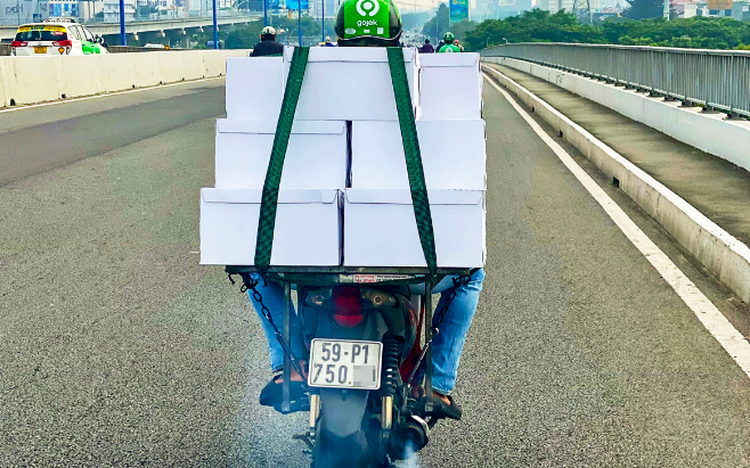
A motorbike carrying goods emits smoke on the Saigon Bridge in Ho Chi Minh City. Photo: Quang Dinh / Tuoi Tre
The city is preparing both personnel and infrastructure for the rollout of the testing program, according to an official from the municipal Department of Construction.
Currently, the city’s streets are congested with a mix of vehicles, including a significant number of outdated, unregistered motorbikes that emit thick, black exhaust.
These vehicles, often repurposed for transporting goods or scrap, pose not only environmental hazards, but also threats to road safety.
Some experts warned that with nearly nine million motorbikes in circulation, many of which are deteriorating, emissions of harmful pollutants such as carbon monoxide (CO) and hydrocarbons (HC) are worsening air quality.
Huynh Thi Thanh Tuyen, a resident of Thu Duc City, said that with such a large volume of traffic, not just from Ho Chi Minh City but also from neighboring localities, the emission testing is an urgent matter to minimize environmental damage.
“Authorities should introduce a clear roadmap for emission control, including incentives for vehicle replacement and strict penalties for non-compliance,” Tuyen said.
The official revealed that a formal emission inspection program could begin as early as 2027, pending legal and technical guidance from the Ministry of Agriculture and Environment.
Currently, all vehicle registration and inspection centers in Ho Chi Minh City mainly serve cars.
As such, adapting these centers to accommodate nearly nine million motorbikes will require significant investment and time.
The municipal department has instructed these centers to review their equipment and facilities, while asking the Vietnam Association of Motorcycle Manufacturers to compile a list of dealerships and repair shops that may serve as future emission testing stations.
These centers could offer emission testing alongside their existing repair and maintenance services to better meet public and business demand.
In 2020, the city launched a pilot program offering free emission testing at eight locations, aiming to test 5,000 motorbikes.
As a result, over 13,000 motorcycles participated in the testing pilot program
Public feedback gathered afterward revealed that more than 76 percent of respondents supported continued emission control measures.
In its broader environmental strategy during the 2020-30, the city tasked the Department of Construction with leading air pollution mitigation efforts in 2025, including promoting public transportation, reducing private vehicle use, and encouraging a shift to eco-friendly fuels.
A comprehensive emission control plan is currently in development.
Meanwhile, Hanoi is also moving ahead with its own ambitious pollution control initiatives.
During the sitting of the Hanoi People's Council in late 2024, chairman of Hanoi People’s Committee Tran Sy Thanh confirmed that the city aimed to clean up its air through a low-emission zone policy.
This will include measures to reduce the number of gasoline-powered motorbikes in designated areas.
Hanoi plans to implement a vehicle exchange program, offering financial support, reduced lending rates, and other incentives to help residents switch from gasoline to electric motorbikes.
Hanoi is set to begin restricting motorbikes in certain areas between 2025 and 2030 as part of its broader campaign to improve urban air quality.


Max: 1500 characters
There are no comments yet. Be the first to comment.